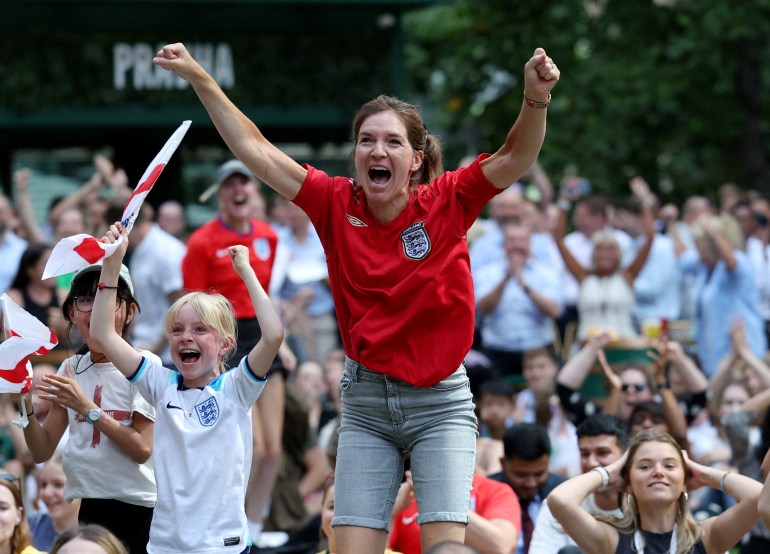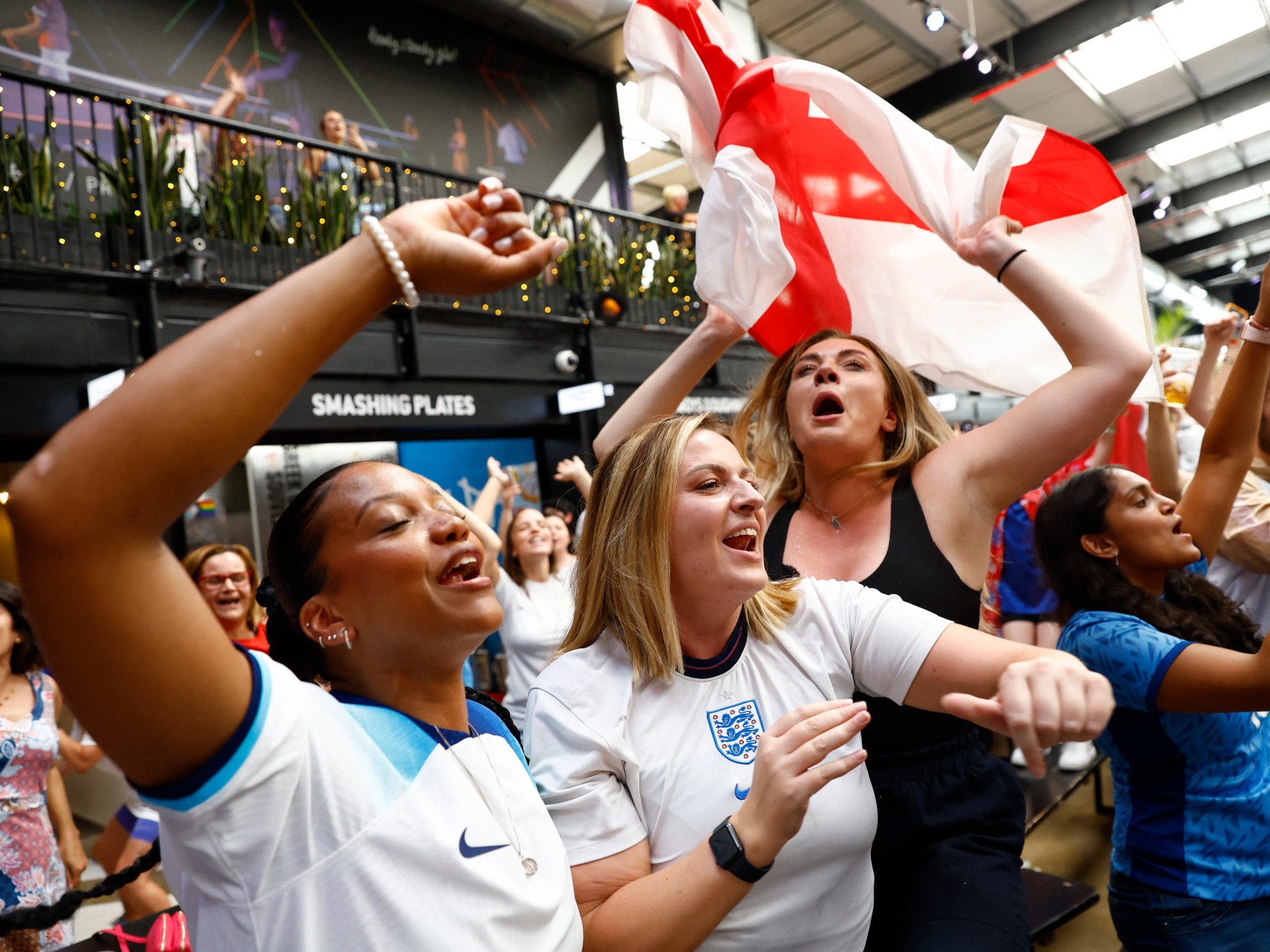London, United Kingdom – The 2023 Women’s World Cup will conclude when England take on Spain in the final in Sydney on Sunday, with the Lionesses desperate to win their nation its first World Cup since 1966.
Support for the Lionesses has steadily grown since last year’s European Championship, in which they beat Germany in the final to lift their first major honour in front of a sold-out Wembley, and before the World Cup final, England has again eagerly united behind the Lionesses.
“[The World Cup] is the greatest prize not only in world football, but world sport,” said Sky Sports reporter Fadumo Olow.
England’s 3-1 win over Australia in the semifinal saw a peak of 7.3 million viewers on the BBC, the biggest UK audience of the Women’s World Cup so far despite the match taking place early on a Wednesday morning. The numbers are expected to be even higher for the final.
“The time difference has made it difficult, of course, but in a way, so, so memorable. I will literally never forget the summer of 2023,” said Jim Johnson, a local of the Wembley area, who was able to watch the celebrations of last year’s Euro win from his balcony.
“I wake up at 3am to watch a football match, and go to work while absolutely buzzing. Both from the happiness of winning, and the one drink I’d allow myself. I wouldn’t want it any other way.”
Olow said that this World Cup was never going to generate the same level of engagement as the home tournament Euros last year that made the Lionesses household names.
“But I think that as England progressed through the tournament, and the timings got a little bit better, it became easier to get behind the team,” she said. “And from the viewing parties that I’ve seen, I’m not going to lie, I’ve seen people out here at 8am on a Wednesday, in their England shirts, with their coffee, excited to watch some football.”
Screenings have been arranged across the country, with local pubs filling with fans watching the matches. Tickets for events screening the knockouts have sold out in minutes, and record numbers are expected to show up at Victoria Park in London for the final.
In London, screens for Sunday’s match will also be set up at Canary Wharf, London Bridge, Hackney, Peckham, and Shepherd’s Bush.
“The time difference may have stopped people from watching the full matches, but I don’t think it has stopped interest,” said Kashvi Khan, a manager at a local community centre in Brentford, who has set up watch-alongs for every knockout match of the tournament.
“I think people who’ve missed matches that kick off so early in the morning are able to watch the highlights, and read the conversations online. Women’s football has never been so accessible.”
England’s route to the final
After England’s win against co-hosts Australia, manager Sarina Wiegman called the run a “fairytale”.
If the Lionesses secure the win on Sunday, it will be easy to retrospectively view their journey to lifting the trophy as almost inevitable. As the reigning European champions, they boast some of the best players in the world, a deep squad, and the experience of already winning a major tournament.
But the Lionesses have faced significant challenges, with Wiegman displaying tactical flexibility to get her team this far.
During the Euros her starting XI did not change once. But England’s World Cup preparations were marred by a string of injuries to key figures such as captain Leah Williamson and star goal-scoring forward Beth Mead – both out due to ACL injuries – and Fran Kirby, the driving force behind the Lionesses creativity from midfield, who required surgery for a knee issue.
Combined with the retirement of key figures in the dressing room like Ellen White and Jill Scott, all of a sudden the Lionesses had lost experience in crucial positions and their balance was disrupted.
England registered poor results before the tournament, suffering a 2-0 loss to Australia and being held to a goalless draw against Portugal in their warm-up games, raising concerns about potential fatigue after a demanding year.
Then, during the World Cup, England struggled to beat Haiti and Denmark in their first two games and key defensive midfielder Keira Walsh missed a game after sustaining a knee injury against the Danes. England cruised to a 6-1 win over China to top the group, but were lucky to beat Nigeria in the last 16 and breakout star Lauren James received a two-game suspension after receiving a red card in that game.

Nevertheless, England navigated these challenges using a combination of depth and experience. Their composed performance in the penalty shootout against Nigeria exemplified their quiet self-assurance, even when outplayed in the 120 minutes of play.
Interim captain Millie Bright coming back from injury significantly bolstered the defence following Williamson’s absence. The team’s extensive attacking depth allowed players like Ella Toone and Alessia Russo, who had only been used as super subs during the Euros, to get more minutes and goals. James also provided a boost before her suspension and is likely to return for the final, whether as a starter or off the bench.
The Lionesses have occasionally displayed vulnerability on the flanks, yet Lucy Bronze and Rachel Daly have managed to do just enough to keep their opponents at bay while reintroducing Walsh to midfield helped the side maintain possession and control of matches.
Nonetheless, individual brilliance and a focused mentality can only go so far without tactical adjustments. After a lacklustre display in the tournament opener against Haiti, the team shifted to a 3-4-3, allowing Bronze and Daly more freedom to go forward. This also suited the centre-backs, with Bright, Alex Greenwood, and Jess Carter providing stability, with the latter two being England’s most consistent performers.
The back three have also allowed the Lionesses to swiftly transition from each third of the pitch, which the team struggled to do before the tournament, which allows them to exploit space against teams that employ a high press. While it did not always result in goals in tight contests, like the match against Nigeria, this approach was clearly evident in the semifinal against Australia, the 3-1 win that got them to their maiden Women’s World Cup final.
Bronze herself told the media that Wiegman has “shown a different side to her … For a couple of rounds now, she’s had to roll her sleeves up a little bit, adapt the team. Previously, people were like, ‘She keeps the same team and she doesn’t change.’ She’s put in a lot of work this tournament to get us to the final, and her experience has really shown through”.
‘Doesn’t matter if it’s men or women’
The Lionesses have naturally drawn comparisons with the England men’s team that went on to win the 1966 World Cup. Many fans now will have not even been alive to see Bobby Moore lift the trophy, but those who were, view a potential Lioness win on Sunday as just as seismic.
“A World Cup win is a World Cup win. Doesn’t matter if it’s men or women. I had tears in my eyes as a 10-year-old boy when Bobby lifted that trophy, and I’m sure they’ll be flowing just as much when I watch Millie do it too,” said Simon White, who co-owns a pub in London Bridge with his son and has been wearing every England top he owns interchangeably throughout the tournament to show his support.
There are still a lot of questions to be answered in the final, such as whether Will Wiegman put James back in the starting XI right away or if there is only room for her on the bench; how the Lionesses’ midfield will handle the technical prowess of this Spain side and; which players will be key in the decisive moments.
But win or lose on Sunday, this side has survived the slump that was expected of them to become one of the world’s pre-eminent teams on the pitch.
Off the pitch, England’s Euros triumph was a catalyst for the growth of the game and more urgent discussions about inclusivity in sport at all levels in the country, the gender wage disparity, and the broader empowerment of young women.
The team are still battling with the Football Association (FA) in a dispute over bonuses, a conversation that was put on hold in advance of the World Cup. With other teams including Jamaica, Spain, and Nigeria also having issues with their respective federations, the hope is that this tournament triggers change.
“I think there’s a lot of catalysts that will happen on the back of this Women’s World Cup,” Olow said.
Sumber: www.aljazeera.com
 Skip to content
Skip to content

